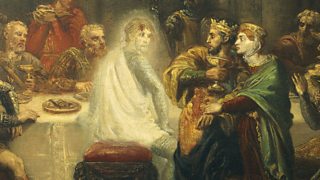Fate in the plays of William Shakespeare helps to create a mysterious and ambiguous mood that entices readers and makes them question the motives of his characters.In the play 'Romeo and Juliet' readers are told from the start that Romeo and Juliet are "a pair of star cross'd lovers" (Act 1, Prologue) which sets the mood that fate is at play leaving little control in the hands of the young couple. Throughout the pair are confronted with omens which only furthers the idea that the tragic ending is an inescapable demise, "my mind misgives some consequence yet hanging in the stars...some vile forfeit of untimely death" (Act 1, Scene 4). Fate is clearly at play in 'Romeo and Juliet' but the same can not be said for 'Macbeth' which is obviously a story of free will concealed under the idea of fate. 'Macbeth' is sometimes perceived as a tragic journey giving readers the impression that fate is forcibly making Macbeth embark down this path, however this is not the case.
 |
| Macbeth going to kill Duncan |
From the start of the play the witches reveal their premeditated encounter with Macbeth where they will embed in him the seeds of their evil game. They eagerly await his approach and instantly reveal to him their 'prophecy' before he has a chance to make a reasonable judgement of them. Macbeth freely listens to them and demands that the witches speak more to him "stay, you imperfect speakers, tell me more" (Act 1, Scene 3). Banquo however approaches the witches in a way one should approach supernatural beings, by showing them that their words no matter how curious they might be, have no impact on him, "speak, then, to me, who neither be nor fear your favours nor your hate" (Act 1, Scene 3). In the beginning Macbeth appears to find the ramblings of the witches as nothing more then nonsense, but he still entertains them and their ideas by requesting to hear more. Macbeth makes the decision to acknowledge what the witches are saying in contrast to Banquo, a decision made by Macbeth and not by fate.
 |
| Banquo's ghost/Macbeth's hallucination after killing his friend |
Macbeth's eagerness to accept what the witches have told him is evident in his quick explanation of the event to Lady Macbeth. He writes her a letter detailing his encounter with the witches, their prophecies and the unbelievable fulfillment of the the premonition that he would be the Thane of Cawdor. Macbeth is quick to consider the seriousness of the prophecies, unlike Banquo who sees no merit for himself in what the witches have said "to you they have show'd some truth" (Act 2, Scene 1). At no time in the prophecy did the witches explain that Macbeth would be King through the act of murder, it was on his own accord that he decided to seize the kingdom this way. Macbeth know's that he has made a grave decision and the audience or readers can instantly see he will lose his sanity as a result of his decision. "These deeds must not be thought after these ways' so, it will make us mad" (Act 2, Scene 2), Lady Macbeth predicts the downfall of her and her husband and Macbeth's ramblings foreshadow his descent into guilt ridden madness, "Macbeth shall sleep no more" (Act 2, Scene 2). The fall of the Macbeth's sanity is a result of their own actions and decisions, they have exercised free will and were not fated to commit the murder of Duncan.
Macbeth's murderous rampage is all on his own accord and not the result of of a supernatural predetermined event, the murder of his former friend Banquo and his son Fleance is committed out of fear and has little to do with the prophecy. Following the murder of Duncan and Macbeth's sudden ascent to the throne Banquo calls into the question the ease for which Macbeth has been granted all the witches said to him. "As the Weird Women promised, and, I fear, thou play'dst most foully for 't" (Act 3, Scene 1). Banquo suspects that Macbeth is responsible for the death of Duncan and ridicules Macbeth and his trust in the prophecy of the witches, "myself should be the root and father of many kings...as upon thee, Macbeth, their speeches shine" (Act 3, Scene 1). Banquo's death only reveals the evil and corrupt nature of Macbeth "barefaced power sweep him from my sight and bid my will avouch it" (Act 3, Scene 1) he uses his power as King to cover up his murder. Banquo's murder proves nothing about fate, but more that Macbeth has freely through his actions shamefully fallen into the mindset of an evil madman.
Although fate is is common element of Shakespearean plays it is only used as a ruse to disguise the terrible decisions Macbeth makes. Macbeth enjoys the idea of fate and prophecies because it helps to veil the wavering line he walks between a proper man and a tyrant. Indeed Macbeth is a man of free will who uses his power to wage chaos and evil, not a man caught up in the fate of three conniving witches.
 |
| Seriously though |



No comments:
Post a Comment